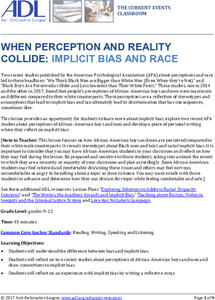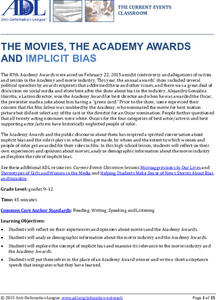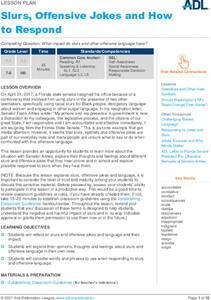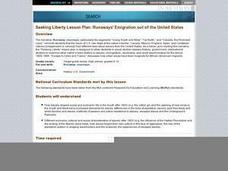Learning for Justice
The Color of Law: Creating Racially Segregated Communities
It is pointed, powerful, and painful! The first of three lessons about laws and practices that support inequality looks at how government policies created and reinforced segregated communities. Young social scientists read excerpts from...
PBS
Amid Rising Economic Inequality, Does America Need a Third Reconstruction?
Young political scientists investigate the Poor People's Campaign protest held in Washington, D.C., on June 18, 2022. They research how the event was reported in various news outlets and consider their stance on whether "poverty is...
PBS
History of Juneteenth and Why It’s Now a National Holiday
June 19 is now a United States federal holiday. Young historians examine the background of the first Juneteenth celebrations and why on June 15, 2021, Congress finally approved "Juneteenth National Independence Day" as a federal holiday.
C3 Teachers
Black Genius: How Did Black Genius Help Build American Democracy?
"How did the slavery system undermine the United States' democratic principles?" This question launches a study of how the Preamble to the Declaration of Independence, Article I, Section 2 of the U.S. Constitution, and Article IV,...
C3 Teachers
Reparations: Why Are Reparations Controversial?
To understand why the topic of reparations is controversial, young scholars gather background information by reading articles, watching videos, and examining cases where reparations were made. Learners consider the lasting repercussions...
C3 Teachers
Anna - One Woman’s Quest for Freedom: What Did Freedom Mean for Anna?
The 2018 film Anna, One Woman's Quest for Freedom in Early Washington, D.C., offers high schoolers an opportunity to examine the sacrifices one woman endured to gain her freedom from slavery.
Anti-Defamation League
Major League Baseball and the Negro Leagues: Correcting an Injustice
It's been a long time coming! In 2020, MLB Commissioner Robert D. Manifred, Jr. stated that "the Negro Leagues would be recognized as official major leagues." Middle schoolers investigate the history of the Negro Leagues and use evidence...
Anti-Defamation League
Microaggressions In Our Lives
Defining, identifying, and learning how to counter microaggression is the lesson's focus for high schoolers. Learners examine a definition of the term, write about their own experiences with microaggression, watch short video examples,...
Anti-Defamation League
Implicit Bias
Everyone has biases, both explicit—ones we are aware of—and implicit—ones we are unaware of. High schoolers learn the differences between explicit and implicit bias in a short lesson where pupils watch a short video, read articles about...
Anti-Defamation League
What are Reparations and Should We Enact Them?
Young social scientists investigate recent legislative proposals for reparations for African Americans. They examine the rationale behind the proposals by viewing videos and reading related articles. To close the lesson plan, scholars...
Anti-Defamation League
When Perception and Reality Collide: Implicit Bias and Race
The big idea in this lesson is that implicit bias often clouds perceptions. High schoolers watch a short video, read research articles, and engage in discussions about implicit bias and how these biases lead to stereotyping. They craft...
Anti-Defamation League
The Movies, the Academy Awards and Implicit Bias
"And the award goes to. . . " High schoolers investigate bias in the movie industry by reading articles, watching a short video, and examining data about the Academy of Motion Picture Arts and Sciences (AMPAS) membership, nominees, and...
Anti-Defamation League
Women’s Inequity in Pay: Could It Be Sexism, Implicit Bias or Both?
Equal pay for equal work? High schoolers research the reasons for the inequity in women's pay. They read articles, examine graphs, engage in discussion, and then craft an essay in which they suggest a way to address the gender wage gap.
Anti-Defamation League
Slurs, Offensive Jokes and How to Respond
How to respond to slurs and offensive jokes is the topic of a lesson designed for middle and high schoolers. After journaling about their experiences with slurs and nasty jokes, participants read an article about a Florida State Senator...
National Endowment for the Humanities
"From Citizen, VI [On the Train the Woman Standing]," Claudia Rankine
Claudia Rankine's poem "From Citizen, VI [On the Train the Woman Standing]," asks readers to consider direct and more subtle forms of prejudice. After discussing the format of the poem, its tone, and the emotions expressed, class members...
Curated OER
Why Do We Suffer From The Rights Of Others?
Young scholars examine how diversity within populations has caused problems. In groups, they develop their own definitions of racism and discrimination. They participate in role-plays in which they gather the appropriate techniques to...
Curated OER
The Fugitive Slave Law and Migration
Students examine the Fugitive Slave Law as a motivating factor for slaves to emigrate outside the United States. After discussing the relationships between fugitive slaves and North American and Caribbean countries, they write essays...
Curated OER
U.S. History: The Second Great Migration
Students examine the migration of rural African Americans to northern cities following World War !!. After predicting the effects of cultural and economic factors, they write essays explaining the impact of migration on communities and...
Curated OER
An Introduction to the Central High Crisis
Students identify key events and participants in the Central High Crisis
Curated OER
Language Arts, Social Studies, African Americans, The Blues, To Kill A Mockingbird
African American history during the Jim Crow era includes encounters with poverty, racism, disrespect, and protest. Harper Lee develops all four of these themes in her famous 1960 novel, To Kill a Mockingbird. To help students understand...
Curated OER
The Heritage of Puerto Rico and Cuba
Students examine the influences of the Hispanic culture in the United States. In groups, they read about the life of a slave in Cuba and identify the misconceptions are discussed. As a class, they define racism, read an essay and...
Curated OER
Rationalizing Race in US History
Students consider the classification of people. In this race studies lesson, students examine the concept of race as it relates to U.S. history and trends. Students research racial discrimination and prejudice in order to support their...
Curated OER
Marcus Garvey and the Rise of Black Nationalism
Fourth graders explore the differing beliefs of African American activists. In this American history lesson, 4th graders examine the views of racism resistance that Booker T. Washington, W.E.B. DuBois, and Marcus Garvey held.
Curated OER
Word Origins
Have you ever studied historical words and found that they were deeply rooted in racism or prejudice? Select a long list of these words to have your class examine. What familiar roots do they have? Do they know when this word originally...
Other popular searches
- Anti Racism
- Prejudice and Racism
- Race Racism
- Racism in Sports
- Racism in England
- Racism America
- Institutional Racism
- Racism Supreme Court Cases
- Racism Lesson Plans
- Racism Against Jews
- African American Racism
- Social Studies, Racism
















!["From Citizen, VI [On the Train the Woman Standing]," Claudia Rankine Lesson Plan "From Citizen, VI [On the Train the Woman Standing]," Claudia Rankine Lesson Plan](http://content.lessonplanet.com/resources/thumbnails/456347/large/u2nyzwvuc2hvdf8ymdizltazlte3x2f0xzeyljexljq2x1bnlnbuzw.png?1679080322)








